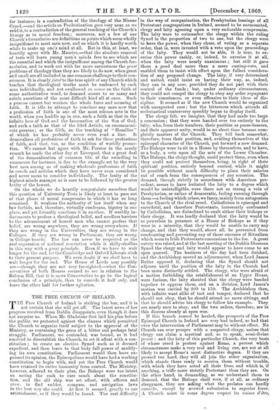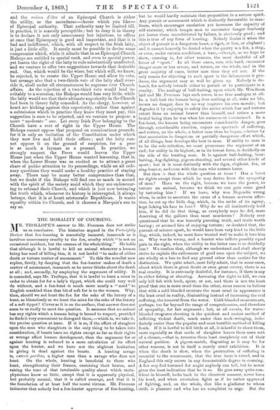THE FREE CHURCH OF IRELAND.
TaE Free Church of Ireland is striking the bar, and it is not certain that she will get off. The latest news of her progress received from Dublin disappoints, even though it does not surprise us. When Mr. Gladstone first laid his plan before the public, we protested against the clauses which permitted the Church to organize itself subject to the approval of the Ministry, as containing the germ of a bitter and perhaps fatal struggle. Parliament, we contended, was bound, as it had resolved to disestablish the Church, to set it afloat with a con- stitution ; to create an elective Synod such as it deemed expedient, and then leave to that body full power of modify- ing its own constitution. Parliament would then have ex- pressed its opinion, the Episcopalians would have had a working constitution to begin with, and yet the Free Church would have retained its entire immunity from control. The Ministry, however, adhered to their plan, the Bishops were too intent on saving the cash to care much about the constitu- tion, and the old ship was set afloat, with officers and crew, to find rudder, compass, and navigation laws in the best way she could. At first it seemed, greatly to our astonishment, as if they would be found. The real difficulty
in the way of reorganization, the Presbyterian leanings of all Protestant congregations in Ireland, seemed to be surmounted, clergy and laity agreeing upon a very endurable compromise. The laity were to outnumber the clergy within the ruling Synod in the proportion of two to one, but the clergy were to have the power, when they chose, of voting as a separate order, that is, were invested with a veto upon the proceedings of the laity. They would not be able, it is true, to ex- ercise this power rashly, or, indeed, to exercise it at all, when the laity were nearly unanimous ; but still it gave them a good deal more than a mere casting-vote, and enabled them to insist with effect upon the fullest considera- tion of any proposed change. The laity, if very determined and united, could insist on having their way, as, indeed, they can in any case, provided they do not part with their control of the funds ; but, under ordinary circumstances, they could not compel the clergy to obey any order repugnant to their consciences, or even offensive to their ideas of dis- cipline. It seemed as if the new Church would be organized with unexpected ease ; but the bitterness which attends all ecclesiastical controversy speedily began to display itself.
The clergy felt, we imagine, that they had made too large a concession ; that they were handed over too entirely to the laity, who, from their numbers, their position as purse-bearers, and their apparent unity, would in no short time become com- pletely masters of the Church. They fell back somewhat, therefore, from their position, and, availing themselves of the episcopal character of the Church, put forward a new demand. The Bishops were to sit in a House by themselves, and to have, as a body, a veto upon all the acts of the Lower Chamber. The Bishops, the clergy thought, could protect them, even when they could not protect themselves, being, in right of their spiritual position, entirely beyond control, while it might be possible without much difficulty to place their salaries out of reach from the consequences of any secession. The demand, though strictly in accordance with American pre- cedent, seems to have irritated the laity to a degree which would be unintelligible, were there not so strong a vein of Presbyterian, or rather of democratic, feeling running through them—a feeling which arises, we fancy,mainly from antagonism to the Church of the rival creed. Catholicism is episcopal and sacerdotal, and therefore Protestants, incessantly confronted by Catholicism, are disinclined to exalt either their bishops or their clergy. It was loudly declared that the laity would be as powerless in presence of a House of Bishops as if they were in a minority, that they would be unable to carry any change, and that they would, above all, be prevented from condemning and preventing any of those excesses of Ritualism which seem to Irish Protestants concessions to the foe. A great outcry was raised, and at the last meeting of the Dublin Diocesan Synod the clergy and laity would appear to have come to an open quarrel. The business of the day had been finished, and the Archbishop moved an adjournment, when Lord James Butler opposed it, declaring that the Synod should not adjourn until the position of the laity in the Church had been more distinctly settled. The clergy, who were afraid of a motion forbidding the establishment of an Upper House, were furious, the laity shouted that the clergy were banded together to oppress them, and on a division, Lord James's motion was carried by 209 to 150. The Archbishop then, with infinite want alike of tact and temper, declared that he should not obey, that he should attend no more sittings, and that he should advise his clergy to follow his example. They are nearly sure to obey, and the two orders, therefore, are in this diocese already at open war.
If this breach cannot be healed, the prospects of the Free Episcopal Church in Ireland are very bad indeed, so bad that even the intervention of Parliament may be without effect. No Church can ever prosper with a suspected clergy, unless that clergy can claim a mystical and, so to speak, semi-divine power ; and the laity of this particular Church, the very basis of whose creed is protest against Rome, a protest which circumstances make a very real and living one, are not at all likely to accept Rome's most distinctive dogma. If they are pressed too hard, they will all join the other organization, which stands there ready to receive them without trouble, with which they have acted all their lives, and which is, if anything, a trifle more strictly Protestant than they are. On the other hand, in demanding, as we understand them to demand, that the Bishops shall vote, if at all, as ordinary clergymen, they are asking what the prelates can hardly concede, except by avowed submission to superior force. A Church must in some degree respect its raison d'être,
and the raison clYtre of an Episcopal Church is either the utility, or the sacredness—choose which you like— of Episcopal authority. That authority may be limited till, in practice, it is scarcely perceptible ; but to deny it in theory is to declare it not only unnecessary but injurious, to affirm at once that Episcopacy is good and important, and that it is bad and indifferent, which, with all respect to the Irish laity,. is just a little silly. It surely must be possible to devise some compromise which, while it admits that in an Episcopal Church Bishops are entitled to special rank, and even to special power, yet leaves the right of the laity to rule substantially unaffected, and we venture to offer two suggestions towards that desirable end. One, which would be the wiser, but which will, we know, be rejected, is to create the Upper House and allow its veto, but arrange also that a two-thirds vote of the laity shall over- ride it, shall under all circumstances be supreme over Church affairs. As the rejection of a two-third vote would lead in- evitably to a secession, the Bishops would lose very little, while the laity would see that their ultimate superiority in the Church had been in theory fully conceded. As the clergy, however, at heart are kicking against this superiority, rather than against a submission which in practice they know they must pay, this suggestion is sure to be rejected, and we venture to propose a more " moderate " one. Let every Irish Peer belonging to the Church have a seat of right in the Upper House. The Bishops cannot oppose that proposal on conscientious grounds, for it is only an imitation of the Constitution under which they now live and hold their offices ; and the laity can- not oppose it on the ground of suspicion, for a peer is as much a layman as a peasant. In practice, we strongly suspect the Peers would leaven the Upper Howe just when the Upper House wanted leavening, that is, when the Lower House was so excited as to attract a great share of public attention to its proceedings, while on all ordi- nary questions they would make a healthy practice of staying away. There may be many better compromises than that, but we doubt if the Bishops will find one so much in accord with the spirit of the society amid which they are endeavour- ing to refound their Church, and which is just now betraying the truth which, whenever its history is interrupted, it always betrays, that it is at heart aristocratic Republican. It wants equality within its Church, and it chooses a Marquis's son to say so.



































 Previous page
Previous page